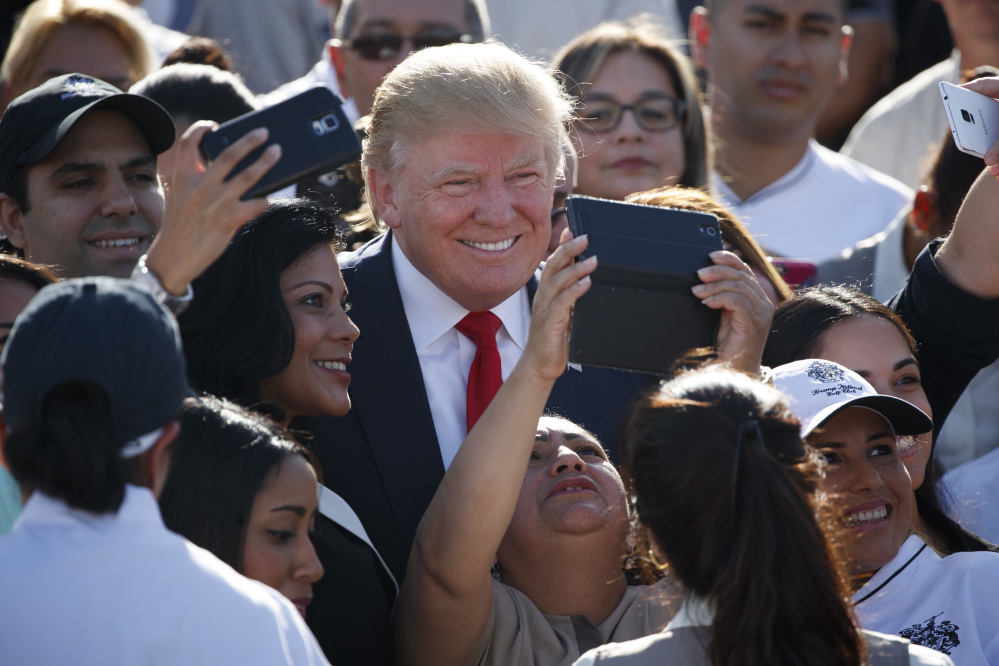With two weeks until the election, Donald Trump spent Tuesday morning at his Doral resort in Miami, talking to the media about a range of issues. As one might expect, one subject that came up was the Affordable Care Act (aka Obamacare), after the government’s announcement that premiums are going to increase substantially for 2017.
Trump has railed against Obamacare in the abstract for months, often citing the risk of premium increases as a rationale for scrapping the program. On Tuesday, though, he tried to make it more personal.
“Obamacare has to be repealed and replaced,” he said, according to a transcript from CBS’s Sopan Deb, “and it has to be replaced with something much less expensive for the people, and otherwise this country is in bigger trouble than anyone thought.”
“So we’re going to repeal and replace Obamacare,” he added. “All of my employees are having tremendous problems with Obamacare.”
That last sentence … doesn’t make sense.
In February, Trump told Fox News’ Sean Hannity that his employees “don’t have to worry about Obamacare.” Why? “I treat them really good with health care,” he said. “It’s a very important thing.”
This makes more sense than saying that all of his employees are having “tremendous problems.” Obamacare is not an insurance program; it is a federal policy that encourages universal health-care coverage by providing a system (the federal or state exchanges) for individuals to get insurance if they are unemployed or their employers don’t provide coverage – and by taxing individuals who forgo coverage. To ensure affordability, the government subsidizes those who enroll under one of the exchanges, assuming they’re at a certain income level.
If Trump’s employees were having these tremendous problems with Obamacare, it would mean that they were not receiving coverage through Trump, which he’d said they do.
A reporter then asked him to clarify whether he provided coverage for all of his employees, and Trump said he did. “So none of them are on Obamacare?” the reporter asked, according to Deb. “No – well, some of them are, but most of them no,” Trump replied.
After Trump made his comments about covering his employees to Hannity, Salon called around to find out whether he offered health-care coverage. Most full-time employees did get coverage through Trump, they found, but part-time employees didn’t. This is not uncommon, but it may explain what happened at the news conference: Trump got a bit out over his skis on the claim that Obamacare was a problem for everyone, and then reeled it back in.
Then Trump went on Fox.
“I don’t use much Obamacare, I must be honest with you,” he said, “because it is so bad for the people and they can’t afford it. And, like, for instance, I’m at the Trump National Doral in Miami, and we don’t even use Obamacare. We don’t want it. The people don’t want it. And I spend more money on health coverage, but we don’t use it. So, you know, when they interviewed those people, they’re happy with their health coverage – that’s because they work for me.”
One of the concerns at the time that Obamacare was passed was that businesses would weigh the costs of providing insurance against the existence of mandated government-run exchanges and opt to cut costs by offshoring health-care costs to employees. So Obamacare includes an employer mandate, under which employers of a certain size have no choice but to provide coverage to most employees. (Full-time employees, that is – with lots of debate over where that line was drawn.) Most of Trump’s businesses are big enough that he has to either provide insurance coverage or pay a penalty.
That’s slightly different than what Trump said. “Use much Obamacare” implies that Obamacare is an insurance program, which it isn’t. Perhaps Trump means that he weighed the pros and cons of providing insurance against the penalties for not doing so? That he provides insurance because he worries about his employees being left to the vagaries of the marketplace? As he said: “I spend more money on health coverage, but we don’t use it,” referring to Obamacare.
The political problem with Obamacare is precisely that it’s a confusing, often messy system. The timing of the premium increases was a political godsend to Trump, and he should have been ready to talk about it. Instead, observers are left trying to suss out what, exactly, Trump was trying to say beyond “OBAMACARE BAD.”
Operating under the assumption that there was anything more he meant to say.
Send questions/comments to the editors.



Comments are no longer available on this story